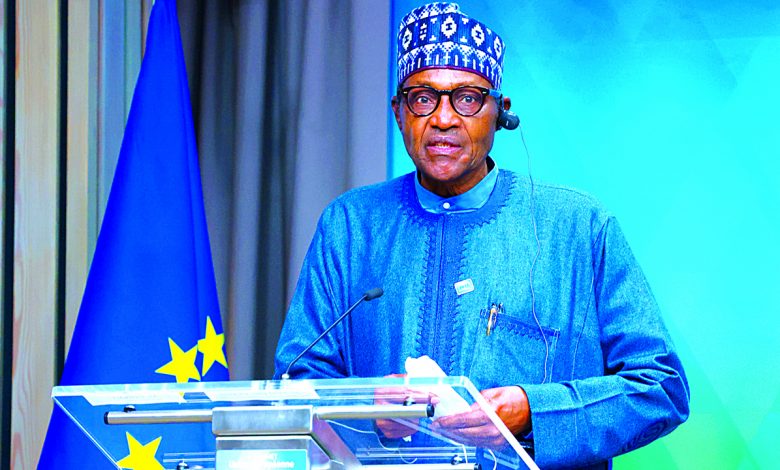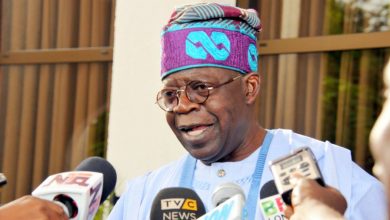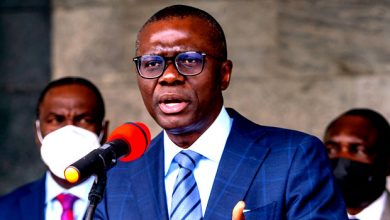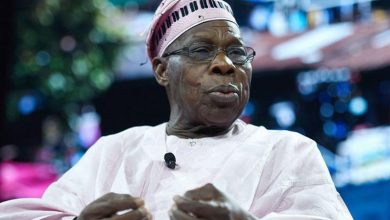Electoral Amendment Bill: INEC in Dilemma as Buhari delays assent
Mulls Use Of Existing Laws, Readjustment Of Election Dates

There are strong indications that unless the Independent National Electoral Commission (INEC) amends its Regulations and Guidelines for the Conduct of Elections (2019), it might use the Electoral Act 2010 for the conduct of the 2023 general election.
This is as a result of President Muhammadu Buhari’s delay in assenting to the Electoral Act Amendment Bill 2021 recently transmitted to him by the National Assembly. The President is currently in Brussels, Belgium, where he is attending the 6th EU-AU Summit.
According to the extant INEC’s regulations and guidelines for the conduct of elections, “Election to the office of President and Vice President, as well as National Assembly shall hold on the third Saturday in February of any General election year.”
Should INEC stick to the rule, the next presidential and National Assembly election would hold on Saturday, February 18, 2023.
Meanwhile, Section 28(1) and (4) of the Bill waiting for presidential assent provides “the Commission shall not later than 360 days before the conduct of an election publish a notice in each state of the Federation and the Federal Capital Territory stating the date of the election.”
By this provision, the threshold the Commission requires to be able to use the Amended Electoral Act in the 2023 election would elapse in three days time is Tuesday, February 22.
However, INEC’s National Commissioner and Chairman, Information and Voter Education Committee, Festus Okoye, told The Guardian yesterday that the electoral umpire could recalibrate its timeframe if the Bill is signed in the next month.
This is also as many lawyers yesterday faulted the position of the Commission’s Chairman, Prof. Mahmood Yakubu, that the law that would guide the next general election, should as a matter of importance, be in place at least 12 to 18 months before the exercise.
President Buhari had on December 21, 2021, via a letter read during the plenary sessions at the Senate and the House of Representatives, declined assent to the Electoral Act Amendment Bill 2021. Buhari had noted that the mandatory use of direct primaries for all political parties in the country would be too expensive to execute, adding that it would put a financial burden on Nigeria’s slim resources. That was the fifth time the President declined assent to amendments to the Electoral Act in the last five years
In March 2018, he rejected the Bill due to some provision that would usurp INEC’s powers on electoral matters. In July 2018, he outrightly vetoed the Bill by refraining from making comments on the Bill until the expiration of the 30 days’ timeline. In September 2018, he rejected the Bill on the basis of drafting errors and cross-referencing gaps. In December 2018, he rejected the Bill because it was too close to the 2019 General Election.
Towards ensuring that the 2023 general election is conducted with an amended Electoral Act that would engender more transparency, improve the electoral process and boost the credibility of elections, the National Assembly had quickly re-worked the current Amendment Bill and transmitted it to him on January 31, 2022.
With the President yet to assent to it at the time of filing this report, Okoye told The Guardian that INEC would rely on the existing legal framework for the 2023 poll if the president fails to sign the bill into law.
His words: “Section 132(2) and 178(2) of the Constitution of the Federal Republic of Nigeria, 1979 (as amended) are the operative provisions relating to the conduct of presidential and governorship elections in Nigeria.
“Both sections provide that an election to the office of the President and Governor shall be held on a date not earlier than 150 days and not later than 30 days before the expiration of the term of office of the last holder of that office.
“Furthermore, Sections 132 (1) and 178 (1) of the Constitution gives INEC the power to appoint a date for the holding of the elections within the confines and ambit of the period circumscribed by sections 123(2) and 178(2) of the Constitution.
“Sections 132(2) and 178(2) of the Constitution are sacrosanct and cast in stone while February 18, 2023 appointed by the Commission for the holding of the Presidential election is movable within the compass and orbit of sections 132(2) and 178(2) of the Constitution.
“It is in the interest of the nation and the electoral process to have an acceptable, certain and unambiguous electoral legal framework at least 12 months before the conduct of the 2023 general election. Legal certainty will aid planning and obviate discretionary actions and remedies.
“Based on the Commissions stand to hold the Presidential election on the 18th day of February 2023, Thursday, February 17, 2022, is exactly 350 days to the said election.
“By section 28(1)&(4) of the Bill waiting for Presidential Assent, the Commission shall not later than 360 days before the conduct of an election publish a notice in each state of the Federation and the Federal Capital Territory stating the date of the election; and appointing the place at which nominating papers are to be delivered.”
Okoye added that Section 3(3) of the Bill provides for the release of election funds to the Commission at least 12 months before the election.
According to him, the same time frame applies to applications by political associations intending to transmute to political parties.
“If the Bill is not expeditiously attended to, the application, enforcement and compliance with the timeframes and schedules in the bill become extremely problematic. The Commission can recalibrate its own timeframe if the Bill is signed in the next one month.
“The Commission is working on a Draft Timetable and Schedule of Activities based on the Bill. The Commission is hopeful that the interest of the nation will prevail and the Bill will become law.
“However, the Commission will proceed with preparations for the conduct of the 2023 general election on the basis of the existing law,” he noted.
Commenting on the issue, a lawyer and former Chief Executive Officer, National Electricity Regulatory Commission (NERC), Dr. Sam Amadi, said there was no constitutional mandate that a new law must be signed 12 to 18 months to allow INEC conduct elections in 2023.
He said: “The deadline is contrived by INEC in the context of the administrative and logistical challenges it face to achieve free and fair elections. We should have had a new electoral law since months ago. It is almost late if you want all stakeholders to understand and play by the new rules. As it were, we will muddle through even if the bill is signed into law today. But this needs not be so. We should have been ahead of the learning curve for the management of elections in Nigeria.
“I have always argued that INEC does not need the new Electoral Act that badly. The powers conferred on INEC by the Constitution and the Electoral Act is sufficient to enable them perform all necessary functions incidental to a free and fair election. The Constitution grants INEC the power as the regulator and every regulator under the administrative law principles is empowered to issue subsidiary legislation, what we call ‘rule-making powers.’ So, under its rule – making powers, INEC can make rules that will streamline the timing and provide guidelines on how elections are to be conducted in Nigeria, including how votes are cast and counted. So, nothing in law prevents INEC from legislating the transmission of results; nothing in law stops INEC from continuing with the implementation of the BVAS programme; nothing in law stops INEC from issuing regulations directing the aspect of voting and counting, as long as those directives do not go contrary to the express provisions of the constitution or the electoral Act.
“The problem with INEC is that it has fashioned itself as a regulator. It has rather fashion itself more as a transaction manager. So, it sees itself basically as providing logistics for elections. But INEC’s major work is rule making, providing legal framework for elections. As a regulator, it should start first from having clear positions for rule making. Those procedures will require comments, rigorous consultations and open process for making decisions. And once INEC can scale through those processes, no court in Nigeria can set aside a validly enacted INEC regulation pursuant to its power in the Electoral Act and the constitution.”
Amadi noted that even though it was regrettable that the president might not sign the law “because of the shenanigans and the self-serving work of the legislators who twice have added provisions not well discussed into the Electoral Act, and therefore provide excuse for a president whose commitment to electoral integrity is at most doubtful,” INEC should get down to work.
“Nigerians should not let INEC up on this. Whether there is a new Electoral Act or not, INEC has a responsibility to ensure free, fair and transparent election come 2023. And I argue that it has enough legal provisions to make any reasonable, rationale and legal powers relating to the integrity of voting, openness of voting and reliability of election transmission and counting. INEC has such powers and should go ahead with that function,” Amadi added.
The Dean Faculty of Law, Redeemer’s University, Ede, Osun State, Prof. Bukola Akinola, however, noted that it was risky to use the Electoral Act 2010 to conduct the 2023 elections, saying it could have legal implications as INEC was already engaging the use of technology.
Akinola said: “Law is dynamic and so is law making. The President must as a matter of utmost importance sign the amended Electoral Bill 2022 in view of the constitutional implications. Leaving the Electoral Act 2010 as it is, when INEC is already engaging the use of technology, may have serious legal implications such as the use Card Readers and Incident Forms of the previous elections. President Buhari ought to begin to live his life as a statesman and not a president elected under the guise of a political party. Whatever the inconvenience, the president should sign the Bill into law.
“It would be un-statesmanlike for the president to jettison the amended Electoral Bill. The National Assembly should assert its authority and veto the Bill as a matter of urgent national importance. It is high time Nigeria is run as an institution and not an individual. The President’s assent is in a chain and not the end of a process. His refusal this time around to sign is inexcusable except there is ulterior motive behind same. The National Assembly should go ahead and do the needful.
“The National Assembly should also go further and amend the Constitution to reflect current Electoral realities, while INEC takes the bull by the horn to maximise powers freely donated to it by the Constitution. INEC has more powers than they think they have.”
A Lagos-based lawyer, Stephen Azubuike, also said: “I’m not aware of any statute that says the substantive law or any amendment to it must be in place 12 to 18 months before election, otherwise, INEC shouldn’t abide by it. Yes, it may make for compliance convenience, but that’s probably where it ends.
“If the amendment doesn’t come to life, the 2023 elections will still hold, save that the country would have missed the opportunity to see to the further development and advancement of our electoral process.”
Another Lagos-based lawyer, Emeka Opara, noted: “Under the Constitution of the Federal Republic of Nigeria 1999 (as amended) there are timelines within which elections into the various offices must be held. Mind you, this goes beyond the issue of Electoral Act. So, whether or not the President signs into law the new Electoral Act Amendment Bill, it will not affect the constitutional thresholds. These thresholds are contained in Section 76(1) of the Constitution (as amended by Section 2 of the Second Alteration Act) for the office of the National Assembly; Section 116(2) of the Constitution (as amended by Section 3 of the Second Alteration Act) for the office of State House of Assembly and Section 132(2) of the Constitution (as amended by Section 4 of the Second Alteration Act) for the office of the President and Section 178(2) of the Constitution (as amended by Section 17 of the Second Alteration Act) for the office of State Governor.
“For example, elections into the office of President must be held not earlier than 150 days and not later than 120 days before the expiration of the office of the incumbent.
“The reason INEC is clamouring for the Electoral Act to be amended in time is that if we are to use the new Electoral Act, there are measures that would be taken under them that must conform to the constitutional timelines. What we are seeing is that the President is pushing for a fallback to the now outdated and outmoded Electoral Act 2010 (as amended), and this is unfortunate, to say the least. There have been identified loopholes in the Electoral Act 2010, which the new Electoral Act has sought to correct. The National Assembly has, twice, tried to do their work. The President appears to not mind the consequences of withholding assent. History will be the judge,” Opara said.
He added: “On the issue of use of technology, this is where the Supreme Court has failed. Clearly, both the Constitution and the Electoral Act 2010 gives INEC the power to make rules for the conduct of the elections into the several offices. The power is clear, but not in terms that exclusively mentions certain modes or technologies. And that is how it is actually supposed to be. Regulations made by bodies like INEC are subsidiary legislations. They are supposed to be easily revised as the body that makes it finds necessary. This is because putting such powers in the main Act like the Electoral Act will bring us to the situation where the President is holding the country at the wrong place. In Atiku v. INEC, the Supreme Court for whatever reason, failed to validate the power of INEC to choose the mode of transmitting results, holding that a digital transmission is unlawful, because the Constitution and the Electoral Act has not specifically mentioned the digital mode. If the Supreme Court had validated the power of INEC to choose its mode under the general powers given to it to make regulations, then whether or not a new Electoral Act is passed would not make much difference because a resolute INEC can use its general powers to go around the political and fraudulent obstacles of politicians. Unfortunately, the Supreme Court failed. This is most unfortunate.”
To the Executive Director of Civil Society Legislative Advocacy Centre (CISLAC), Auwal Musa Rafsanjani, INEC resorting to the 2010 Electoral Act (as amended) if the president declines assent to the Electoral Act Amendment Bill, might spell doom for the nation in 2023.
According to him, the existing legal framework could not guarantee a free, fair and credible poll.
“It will affect the smooth conduct of the election. The president needs to honour his word. He had made observations on the earlier bill sent to him and the National Assembly has worked to ensure that they addressed those concerns as expressed by the President so it is expected that he should honour his words by signing the bill into law.
“The danger of using the existing framework is that INEC will continue to conduct analogue election. And those who want to perpetrate fraud in the elections will have opportunity to do that. If the president is interested in transparency, having lost seven years without initiating any positive reform in the electoral process, this is an opportunity for him to right the wrong,” he stated.
Rafsanjani noted that the delay in having a new electoral law shows that the country was not prepared to move forward and ensure transparency in the electoral system.
However, a former National Commissioner with the Independent National Electoral Commission, Prof. Lai Olurode, said a new electoral law would not guarantee credible poll in 2023.
He told The Guardian in an interview yesterday that Nigerians must begin to focus on the human tendencies during elections.
According to him, the existing framework could actually give Nigeria free, fair and credible elections.
“The 2010 law is what is on ground. I think we should allay fear of the public. Let’s look at the worst-case scenario and that is if the President withholds assent to the bill and INEC has to make use of the 2010 Electoral Act (as amended) for the 2023 poll. One thing is if the President fails to sign there is nothing anybody can do.
“The existing framework is not bad. There is no amount of legal input that can on its own give a good election. The human tendencies are what are wrong with our elections. The laws are good enough. Of course, there is no perfect law, but the agitations, for me, are sometimes unnecessary, provocative and makes one not to focus on the human tendencies in the electoral process.
“The law will not administer itself. It is still has to be administered, interpreted and acted upon by human beings. We need to focus more as well on the mindset especially of politicians, INEC officials who manipulate the law to suit the interest of particular candidates or party,” Olurode said.
He, however, urged the president to sign the Electoral Act Amenment Bill into law so as not to put undue pressure on INEC.
He concurred that delay in signing the bill into law might affect the date of the election and required logistics that have to be put in place for the election.
He added: “INEC needs to study and understand the law. In terms of logistics, I am referring to the printing of sensitive and procurement of non-sensitive materials. These are not things you will go to the market to purchase. It has to be customised. One thing is that shifting the date for an election affects the conduct of another election and other activities of INEC.”
Meanwhile, a coalition of civil society groups, yesterday, expressed fear that the same fate that befell previous attempts to amend the Electoral Act under the present administration awaits this current version.
At a briefing in Abuja on the imperative of a timely assent to the Electoral Act Amendment Bill, the CSOs accused the President of playing the waiting game yet again in spite of appeals from different quarters.
Speaking behalf of the coalition, the Convener, Nigeria Civil Society Situation Room, Ene Obi, said: “Our concerns are further heightened with the President’s delay in fulfilling a promise he made to Nigerians during an interview on national television indicating he will assent to the Electoral Bill if the National Assembly reworks the bill and expands the procedure for nomination of candidates.
“We note the provision of Section 58(4) of the 1999 Constitution, which gives the President a timeline of 30 days to assent or withhold assent to a Bill. However, a combination of the newly introduced timelines for electoral activities in the bill and imperative for INEC and other stakeholders to commence early preparations for the upcoming elections provides a compelling justification for immediate assent of the bill.
“For instance, Clause 28 (1) of the Electoral Bill 2022, requires INEC to issue Notice of Election not later than 360 days before the day appointed for an election. As indicated by INEC, the scheduled date for the 2023 Presidential and National Assembly election is 18th February 2023. Therefore, the Notice of Election for the 2023 general election should be issued on 22nd February 2022 because the total number of days from 22nd February 2022 to 17th February 2023 is 360 days. If the President gives assent to the bill on or before February 22nd, 2022, INEC will be legally bound to issue Notice of Election, and the dates for the 2023 elections will be maintained. However, if the President acts on the bill after February 22, 2022, the dates for the 2023 election and other subsequent electoral activities will be affected.”







